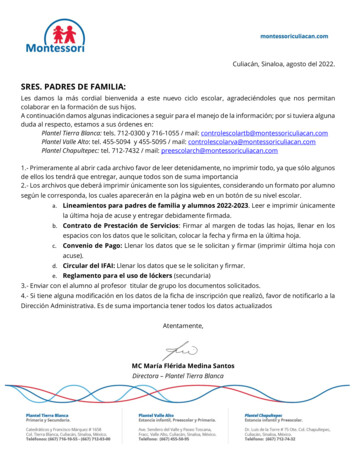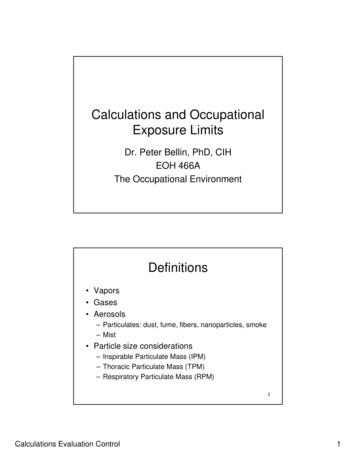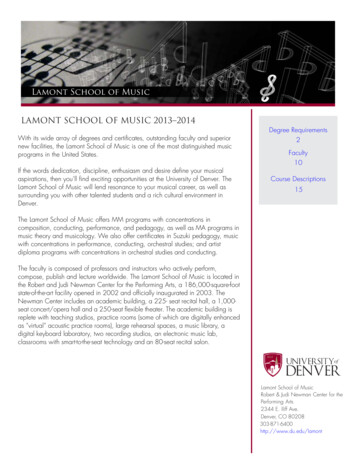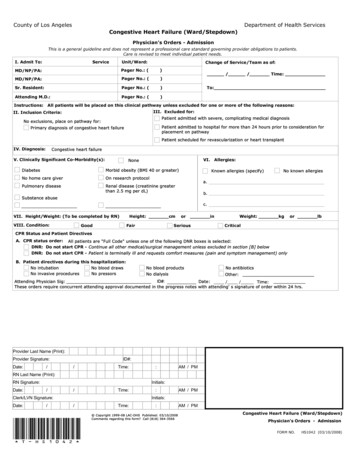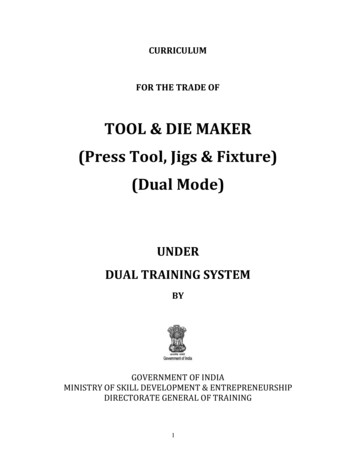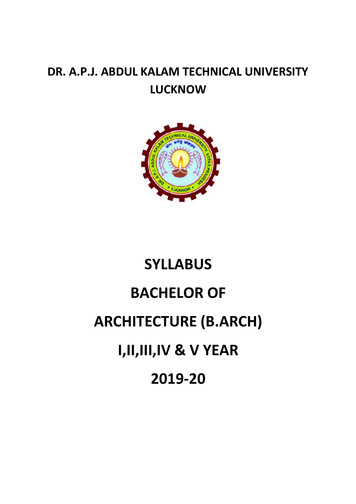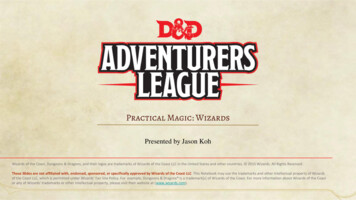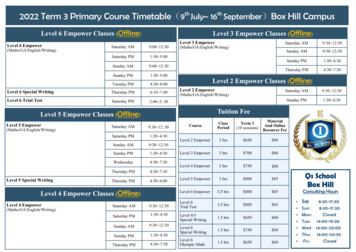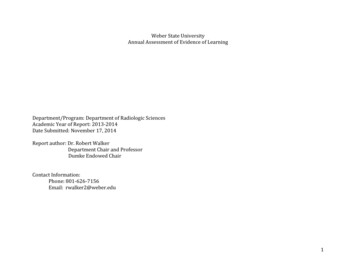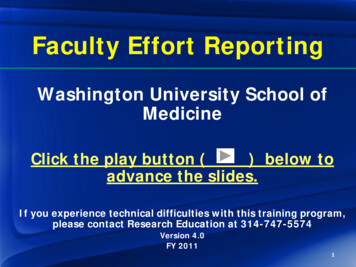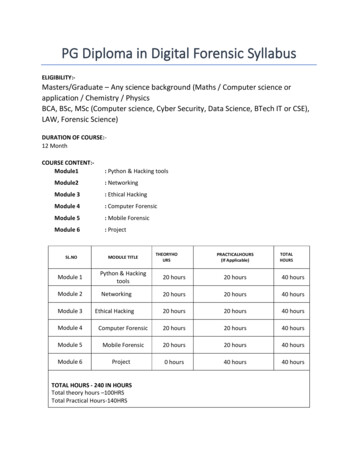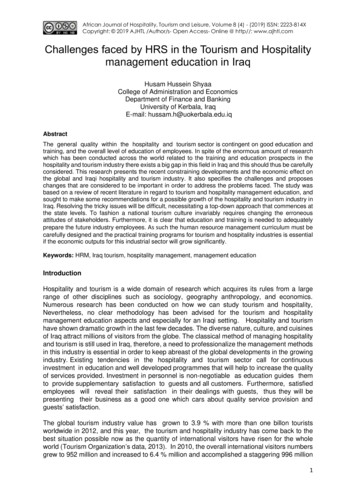
Transcription
African Journal of Hospitality, Tourism and Leisure, Volume 8 (4) - (2019) ISSN: 2223-814XCopyright: 2019 AJHTL /Author/s- Open Access- Online @ http//: www.ajhtl.comChallenges faced by HRS in the Tourism and Hospitalitymanagement education in IraqHusam Hussein ShyaaCollege of Administration and EconomicsDepartment of Finance and BankingUniversity of Kerbala, IraqE-mail: hussam.h@uokerbala.edu.iqAbstractThe general quality within the hospitality and tourism sector is contingent on good education andtraining, and the overall level of education of employees. In spite of the enormous amount of researchwhich has been conducted across the world related to the training and education prospects in thehospitality and tourism industry there exists a big gap in this field in Iraq and this should thus be carefullyconsidered. This research presents the recent constraining developments and the economic effect onthe global and Iraqi hospitality and tourism industry. It also specifies the challenges and proposeschanges that are considered to be important in order to address the problems faced. The study wasbased on a review of recent literature in regard to tourism and hospitality management education, andsought to make some recommendations for a possible growth of the hospitality and tourism industry inIraq. Resolving the tricky issues will be difficult, necessitating a top-down approach that commences atthe state levels. To fashion a national tourism culture invariably requires changing the erroneousattitudes of stakeholders. Furthermore, it is clear that education and training is needed to adequatelyprepare the future industry employees. As such the human resource management curriculum must becarefully designed and the practical training programs for tourism and hospitality industries is essentialif the economic outputs for this industrial sector will grow significantly.Keywords: HRM, Iraq tourism, hospitality management, management educationIntroductionHospitality and tourism is a wide domain of research which acquires its rules from a largerange of other disciplines such as sociology, geography anthropology, and economics.Numerous research has been conducted on how we can study tourism and hospitality,Nevertheless, no clear methodology has been advised for the tourism and hospitalitymanagement education aspects and especially for an Iraqi setting. Hospitality and tourismhave shown dramatic growth in the last few decades. The diverse nature, culture, and cuisinesof Iraq attract millions of visitors from the globe. The classical method of managing hospitalityand tourism is still used in Iraq, therefore, a need to professionalize the management methodsin this industry is essential in order to keep abreast of the global developments in the growingindustry. Existing tendencies in the hospitality and tourism sector call for continuousinvestment in education and well developed programmes that will help to increase the qualityof services provided. Investment in personnel is non-negotiable as education guides themto provide supplementary satisfaction to guests and all customers. Furthermore, satisfiedemployees will reveal their satisfaction in their dealings with guests, thus they will bepresenting their business as a good one which cars about quality service provision andguests’ satisfaction.The global tourism industry value has grown to 3.9 % with more than one billon touristsworldwide in 2012, and this year, the tourism and hospitality industry has come back to thebest situation possible now as the quantity of international visitors have risen for the wholeworld (Tourism Organization’s data, 2013). In 2010, the overall international visitors numbersgrew to 952 million and increased to 6.4 % million and accomplished a staggering 996 million1
African Journal of Hospitality, Tourism and Leisure, Volume 8 (4) - (2019) ISSN: 2223-814XCopyright: 2019 AJHTL /Author/s- Open Access- Online @ http//: www.ajhtl.comtourists globally in 2011- thus an increase rate of 4.6 %. There has been an affirmativeincrease in tourists and the maximum tourist arrivals in 2012 were predominantly across thewhole of Europe, Oceania, America, Caribbean and North Africa.Taking into account its long-term tendency, tourism has continued to extend and vary in thelast six decades. It has become the fast-growing economic sector in the world. Many newbeautiful destinations have appeared and these are different from the traditional destinationslike America and Europe. The multinational tourist numbers have increased from 277 millionvisitors in 1980 to more than one billion in 2012 with a constant rising rate of 3.5 to 4 % in thelast decade except in the economic recessions period (2001and 2009). Tourism Towards2030, (World Tourism Organization, 2011; Thapa & Panta, 2019 ), forecast that internationaltourist arrivals will grow by an average 3.3 percent every year from 2010 to 2030 over thewhole world and the total tourist visitors will reach an estimated 1.8 billion travellers by 2030.The International Labor Organization, (2011) reports record that the hospitality and tourismindustry is one the most active industries and it will provide about 235 million jobs over theworld in next decade. In the next ten years up to 2030, the growth in the tourism industryeconomies income is expected to rise at 4.4 percent per year (World Tourism Organization,2012).In Iraq, the number of tourists was 892,000 in 2013. In 2012, the value of economic incomefrom universal visitors was 1.64 billion. Iraqi north, is considered to be a safe region of Iraq,thus it became an attraction region for tourism. In 2012, Iraqi north recorded a 70% increasein tourist visitors. Iraqi north had 106 hotels in 2007 and this number grew to 405 in 2012.Najaf and Karbala are also considered to be attractive tourist destinations and the tourismindustry in the cities flourished after the end of Saddam Hussein's rule, and the number ofvisitors to these cities increased to 5 million in 2019 (Razzaq,2019). Thus, the tourism andhospitality industry in Iraq has become an essential sector in progressing the country’seconomy. In recent times the education related to the hospitality and tourism industry hasbeen acquiring great attention from government and private sector stakeholders, and they alltry to approach the education aspect positively, and are looking to introduce reforms andsuitable strategies for hospitality and tourism management education in Iraq. The presentresearch was an illustrative study of the tourism industry progression and expansion in respectto the world as well as Iraq. The reviewing of current literature was an endeavour to discoverthe challenges and the acquiescence that faces the HRM aspects for the educators in the Iraqitourism industry (Newton, 2015).Related workMany research studies have been conducted in the domain of hospitality and tourismmanagement education, precisely in the countries that have a notable effect in this industry.In the past, the research has been performed on frameworks including training schemes andimplementing of curricula, investigation of methodologies being used in the tourism andhospitality management education offerings. A brief survey of this research is demonstratedin the following section.Haywood, (1989) contended that education approaches customarily utilized in the hospitalityand tourism education are getting to be old fashioned and that specialized information gets tobe old fashioned rather rapidly. Education is not only based on the skill and knowledge aperson acquires in his early life. Education skills should be updated according to social andorganisation activities in the dynamic nature of the industry. Haywood’s study alsorecommended that the students should be motivated to learn more about the tourism andhospitality industry and build up their knowledge depending on the free experimentation2
African Journal of Hospitality, Tourism and Leisure, Volume 8 (4) - (2019) ISSN: 2223-814XCopyright: 2019 AJHTL /Author/s- Open Access- Online @ http//: www.ajhtl.comallowed in work scenarios. These suggestions were also recommended in other studies suchas Pavesic,(1993) and Lewis (1993).Ritchie (1995) designed and developed a hospitality and tourism model based on acombination of the theoretical theories and practical experiments. His model constraint wason the balancing between the previous scopes. Moreover, his model emphasized thebalancing between environmental preservation and economic expansion. The model alsopresents an equilibrium between practical HR management expertise and social sciencesunderstanding.Formica, (1996), and Smith and Cooper (2000) underscored the need to think aboutglobalization and internationalization aspects. They recommended the way the global aspectsshould be taught in the hospitality and tourism programmes and in the developing of suchprogrammes. Olsen et al, (1998) and Okumus et al, (2005) advocated developing hospitalityand tourism education programme orientations towards strategic management. Chen et al,(1999) studied the relationships between hospitality and tourism academic programmesparticularly for curricular design. They suggested an objective structure to upgrade theprogrammes in hospitality and tourism.Lefever et al, (1998) produced a review on how the tourism and the hospitality industry canbe improved if the education curricula are based on human-resources skills and interpersonalskills development. Chung (2000) conducted a study to produce a dynamic plan for improvingtourism and hospitality curricula by focusing on teaching specialised courses, inadministration, communication and foreign languages. Morgan (2004) debated that tourismand hospitability are a thing apart from the economic expenditure so what is needed shouldbe taught. Therefore, the constraint on teaching liberal humanistic values, creativity andimagination which are essential for creating effective business managers, must be lifted.Lam and Xiao (2000) specified the gap between the provided staff and demanded staff qualityis big and declared that the key problem of tourism and hospitality education is what is oftena decadent curriculum design. The study robustly excludes the notion that tourism andhospitality institutions should provide high-quality employees and not only large quantity ofunskilled employees.Collins (2002) argued that the problems in hospitality and tourism education are problemsfrom the stakeholders' viewpoints. This research also discussed the effectiveness of thecurriculum on the graduating students in cases where there is a missing component betweenacademic and practical experience. Solent, et al (2007) recommended that tourism andhospitality related topics such as leisure, and sport education curriculum should be linked withthe industrial needs.Moreover, Echtner, (1995) suggested a three approach method of entrepreneurial, vocationaland professional education in the curriculum for the hospitality and tourism education. Amoah,(1998) suggested a curriculum based on teaching the marketing subjects to face thechallenges of the hospitality and tourism industry. Amoah and Baum (1997) suggesteddesigning an education curriculum based on the consultation between the tourismstakeholders and education policy developers.Esichaikul and Baum (1998) examined the role of policymakers in the theme of developingtourism economies. They specified the needs of the hospitality and tourism industry such asthe maturity, cohesiveness and expertise needed. Mayaka and Akama, (2007) demonstratedthat the third world countries suffer from shortages in resources and a well-designed tourism3
African Journal of Hospitality, Tourism and Leisure, Volume 8 (4) - (2019) ISSN: 2223-814XCopyright: 2019 AJHTL /Author/s- Open Access- Online @ http//: www.ajhtl.comtraining planning and the education institutions are thus unable to provide such training withan element of human resources management included. This research also suggestedintroducing an approach to managing the hospitality and tourism activities in such countries.Breakey et al, (2011) proffered an academic model to merge hospitality and tourismeducational methods built on an analytical review of the literature. Their model illustrates therelationship between the tourism and hospitality education methods according to both theeffect of the actual design and general orientation aspects that structured the tourism andhospitality curriculum programmes. Another model was suggested by Dale and Robinson,(2001) depending on general, practical, product and market-based themes in tourismeducation. Baum, (2002) recognised and studied a very vital issue of the predications of staffin the hospitality and tourism sector relating to the new graduate staff abilities. Baun reviewedthe importance of taking into account the nature of the work in developing the skills and trainingrequirements for the hospitality and tourism sector. Rimmington, (1999) identified the deepconcerns about the quantity and quality assessment for graduate standards. Also highlightedwas the impact of information technology in the hospitality and tourism sector.Lashley, (1999) studied the assumptions of the stakeholders about the managers in the future.He emphasized thaat managers should have practical and organizational skills and theeducators should provide a curriculum to meet these requirements. Kay et al, (2000) specifiedthe essential components for a successful tourism and hospitality industry. These componentsare preserving professional skills and cultivating a trust climate with the customers’ andupholding the highest possible ethical standards. They discussed the education programmeand said it should take into account understanding the organizations, tasks and goals, sellingtechniques and analysing the forecasting reports. Littlejohn et al, (2004) discussed that thefuture prosperity of tourism and the hospitality sector and stated that these are hugely affectedby the globalization trend and the ability of many comoanies to be highly competitive.Raybould and Wilkins (2005) explored and specified that self-management skills, problemsolving and interpersonal skills are the most important skills that graduates should have.Baum, (2006) also studied the skills the graduates' staff need to have and he added to theprevious skills that of aesthetics and the experience. Weber (2006) focused on the significanceof teamwork and collaboration in solving the problems and challenges faced by the tourismand hospitality industry. Tesone and Ricci, (2009) also conducted a study to examine thedesired general knowledge, practical skills and abilitie the employees in the tourism industryshould have. Much research has addressed the human resource management changes forthe tourism and hospitality education in countries. Jauhari (2006) explored the connectionbetween the requirements of the hospitability and tourism industry and the education provisionin India. Recently, Situmorang, et al (2019) conducted a study on the relation between therequirements of the hospitability and tourism industry and the education providers inIndonesia. Also Afifi, et al., (2019) studied the same relationship in Oman. In addition, CamposSoria et al., (2019) explores the effect of the employees’ practical skills in booming the tourismindustry in Europe. Based on the presented research which was collected from pertinentstudies conducted in the last thirty years relating to hospitality and tourism education subjects,the major problems and challenges have been shown to be those which face the humanresource management offerings in the hospitality and tourism industry education scenario.Research MethodologyThe present research is an illustrative study in nature and records the recent challenges andtrends that face human resource management in the hospitality and tourism education in theworld as well as the service providers in the case of Iraq. Additionally, the methods or the4
African Journal of Hospitality, Tourism and Leisure, Volume 8 (4) - (2019) ISSN: 2223-814XCopyright: 2019 AJHTL /Author/s- Open Access- Online @ http//: www.ajhtl.comapproaches that were used to resolve these challenges depending on the deductions aredrawn from reviewing the existing state of the literature which suggests a way forward.Problems in Hospitality and Tourism Management EducationThe following deductions illustrate the many tourism and hospitality challenges, and alsospecify their context differences in the Iraq industry as well as the world industry:GlobalisationToday, the tourism industry market is not only just local but has rather rapidly developed on ahuge global scale with the manifestation of globalisation. This fact has been highlighted asone of the most severe challenges addressed by numerous researchers including Formica,(1996), Olsen et al., (1998), Smith et al, (2000), and also Okumus et al, (2005) in their recentresearch undertakings. These studies do not emphasise only on the policymakers role inintroducing the tourism and hospitality service in a global manner to capture the internationalvisitors but also emphasise the role of the educators in providing programs and curriculabased on global needs, languages, with multicultural and multi-ethnic orientated scopes. Theteachers need to thus inculcate programs to forecast the global markets and train theprofessional staff who should be able to meet the global hospitality and tourism industryrequirements. Service delivery is often variable and difficult to standardize due to thepersonal nature of the contact between a customer and an employee in a hospitalityor tourism business. Employees often vary in interpretation of what precisely a customeris asking, but even though service may be intangible, its quality is reflected across fivebroad dimensions: tangibles (appearance of physical elements), reliability (dependability,accurateperformance), responsiveness (promptness and helpfulness), assurance(competence, courtesy,credibility and security), and empathy (easy access, goodcommunications and customer understanding). These all need to be taught to studentswho will be future employees in a globalised work environment by well versed educators(Nicolaides, 2014).Development as Industry ExpertiseIn the future, if it is to flourish, the tourism and hospitality industry should not depend only onpeople just visiting certain beautiful destinations and touring around places. It should be a partof the experience in the industry. Many researchers like Chen et al, (19990, Morgan, (2004),Baum, (20060, and Dale et al, (2001) have argued this concept. They specified that theeducation curricula designers should add topics related to the humanistic values to accomplishthe administrative objectives of creating effective managers who are able to do well in thedynamic environment in which they work. Nicolaides (2015) states that WIL/Experientiallearning/cooperative education are very important educational philosophies in which theformalization and integration of work experience into the theoretical curriculum is of theessence. If the best quality hospitality employees are to be unleashed onto the Iraqieconomy a culture of learning must infuse the character of the industry.Nicolaides (2016) says that without the effective codes of ethics and a high level of moralintensity, a hotel cannot hope to be successful in an industry which is saturated for the mostpart and increasingly under the spotlight by the customers who pursue the best value formoney deals. The hotel service providers need to assess the ethicality of their current serviceconditions from both an employees and a customer’s standpoints. In addition, to lay afoundation in which employees get well trained in different areas, it is necessary to define the5
African Journal of Hospitality, Tourism and Leisure, Volume 8 (4) - (2019) ISSN: 2223-814XCopyright: 2019 AJHTL /Author/s- Open Access- Online @ http//: www.ajhtl.comterm ‘multiskilling’ which is viewed from a number of miscellaneous perspectives. Generallyspeaking, multiskilling is the attainment of supplementary task-related skills andknowledge in a hotel or tourism enterprise, which empower an individual to perform awider range of tasks and functions within a business (Nicolaides, 2014).Focusing on an administrative curriculumAt the current time, the demographics, the industry dynamics and organizational educationare varied .Thus the position of professional staff in the workplace has become very vital anddemanding. The professional staff should have multi-functional skills such as strategic thinkingand the ability to resolve the complicated business framework. Many researchers such as(Lefever, 1998; Rimmington, 1999; Chung, 2000; Raybould, 2005 and Tesone, 2009) haveasserted the need to be including different new-fangled managerial skills in hospitality andtourism management education curriculla and programs such as marketing, informationtechnology and economic management. They debated the curriculum and programs shouldbe career-oriented and have a work integrated component so that and in this case, no moretraining is needed for the staff in the workplace.The linkage between Educators and Policy makersIn the new industry environment, the compatibility between the policymakers requirementsand the hospitality and tourism education policy is critical. Authors like Amoah, (1998), Baum,(1997), Esichaikul, (1998) have considered the significance of evolving economic destinationsin the tourism and hospitality industry sectors. Theses researchers suggested that all thepossibilities must be explored and a tourism education policy should include all the aspectsand the requirements that the tourism and hospitality industry managers demand, and theeducators should apply these new policies in their educational programs and designs thereof.Nicolaides & Kearney (2012), state that policy makers need to be promoting awareness oflegal requirements and liabilities in for example, food and beverage operations in hotels.There is thus a very important link between these two stakeholders - law makers and hoteloperators.Development of entrepreneurshipThe tourism and hospitability teachers should be focused on improving human skills such asinnovation and creativity in the graduating students who are future staff because these skillsrepresent an essential requirement in the current global hospitality and tourism industry andare required by the dire economic situation. Many researchers (Echtner, 1995; Amoah, 1997;Morgan, 2004; Weber, 2006; and Mayaka, 2007) have specified the need of improvingentrepreneurial abilities and its parameters in the hospitality and tourism industry. They alsohighlighted the importance of practical experiments in developing the education curriculumand the effect of that on the tourism and hospitality industry growing to important levels toaddress societal woes. Academics working on curricula should develop modules which arein line with the industry needs and which encourage entrepreneurship and this will likelymake any training transferable to other employers and also encourage employees to be morepositive about undergoing multiskilling training (Nicolaides, 2014: 78).Competency improvementDeveloping competencies in graduating students is an essential requirement in the tourismand hospitability industry evolution. This point is discussed in many studies for example Kay,(2000), Baum, (2002), Littlejohn, (2004), Raybould, (2005) and Baum, (2006). Competent6
African Journal of Hospitality, Tourism and Leisure, Volume 8 (4) - (2019) ISSN: 2223-814XCopyright: 2019 AJHTL /Author/s- Open Access- Online @ http//: www.ajhtl.comemployees should have the following skills and morals for example, realizing customerproblems and helping them, preserving ethical working standards, growing a trust climate,adapting to any changes in a creative way, learning about selling approaches, understandingand analysing forecasting records, understanding teamwork, have a risk-taking ability,communication in a variety of ways and languages, a spirit of creativity, innovation, and triedexperience in solving problems. The stated studies all focused on putting the practicaleducation on an important equal footing with the education curriculum. Nicolaides (2015)maintains that the student/trainee should be provided greater opportunities from which to learnmore about how the industry functions and sanctioned to be effective in the future industryrole they will serve in as is the case in for example, Germany, and this should be the primaryconcern of both industry and the education provider. “Appropriate employee training inmultiskilling initiatives are the critical factors which promote the provision of servicequality consequently, hotels that multi-skill employees should provide training which focuseson employees’ professional attitudes and behaviours in the workplace, especially relatingto guests” (Nicolaides, 2014: 77.The teachers in the hospitality and tourism education organisations should concentrate ondeveloping such desired competencies among their students, in this case, the graduated staffwill be found to be acceptable and effective in the tourism and hospitality industry.Filling the gap between Industry and AcademiaOne of the crucial aspects that the teachers should be focused on, is the contrast between thetourism and hospitability industry’s needs and the ability of the teachers to impart the neededsoft and hard skills, information, strong work ethic and the ethos required of the professionalsthat are needed. There need to be more graduate students for developing the industry to thedesired levels. Lamand et al, (2000), Collins et al, (2002), Jauhari et al, (2006), and alsoRobinson et al, (2007) and many other researchers have shown great concern for thementioned previous aspects and have recommended serious educational maintenance in theknowledge that curriculum produces to graduates. Equally important are efficiency andstandardization of tourism and hospitality education training. In this case, the graduatedstudents from tourism and hospitality education schools can only provide industry needs ifthey are adequately trained.A necessity for improving the blend between practical training and academic offerings is theessential aspect of developing hospitality and tourism industry managers in terms of quantumand the goodness of their natures’ as the industry needs concerned people to serve therein.The researches also recommended that the development of curriculum and programmesrelated to hospitality and tourism should be done with respect to only industry’s requirementsand this can reduce the gap which exists between the workplace and an academic institutiondramatically and lead to positive outcomes.DiscussionThe tourism and hospitality industry accounts for about one tenth of the global economy, andsteady progress in this industry is forecasted in for future. Therefore, it is indispensable todevise and offer suitable programs and have strategically driven policies for all the educationalaspects. Education related to industry management plays an essential role in developing thetourism and hospitality industry overall and should thus be nurtured. Productivity needs to7
African Journal of Hospitality, Tourism and Leisure, Volume 8 (4) - (2019) ISSN: 2223-814XCopyright: 2019 AJHTL /Author/s- Open Access- Online @ http//: www.ajhtl.comimprove in the industry and employee speed and outputs require re-energising. Strategiesmust be then devised which consider an aging workforce and current workers must bestimulated to increase their adaptability and hunger for learning new skills. Ways need to besought to consider the needs of especially Iraqi women who are wives and mothers inthe workforce who are expected to work very arduous shifts in many cases (Nicolaides,2014:71)Taking into account, the current world orientation and the predicament of the tourism andhospitality industry in Iraq, it can be deduced that hospitality and tourism will be need to beone of the most important tributaries for the country’s economy. Iraqi educators should berelated directly to the industry in the sense of consultation on needs and this will cause apractical response to all the challenges which have been recorded and highlighted in theexisting literature review. Iraqi tourism and hospitality teachers can learn from the hypothesis,theories and practices that have been utilized by various industry leaders. By examining thesuggestion made in this research, and the account of the industry challenges and problemsposed, the teachers can further develop all their teaching curriculla and this will lead to anupgrade in the quality and suitability of the graduated professionals. This, in turn, will enhancethe tourism and hospitality industry and contribute to growing the downtrodden country of Iraq.ConclusionOn the one hand, this research offers some benefit to academicians and researchers, and onthe other, to the staff and the managers of the tourism and hospitability industry. Generally,this research gives an inclusive review of the current literature which is relevant to the tourismand hospitality education sector. The suggestions, which were drawn from this research, willhopefully be of interest to especially the educators and institutions. The important aspects inthis research offer a guide to help handle the many challenges and problems that face thehuman resource management practitioners in designing the curriculum and the practicaltraining programs for the tourism industry all aimed at towards helping the desired economicupturn for the industry sector and nation in general. The issue of human capital is significantlyimportant to the long-term development of the tourism sector in Iraq.Tourism and hospitality provides sorely needed employment to individuals of all ages and skilllev
College of Administration and Economics Department of Finance and Banking University of Kerbala, Iraq . HRM, Iraq tourism, hospitality management, management education Introduction Hospitality and tourism is a wide domain of research which acquires its rules from a large . Collins (2002) argued that the problems in hospitality and tourism .
